Text
3 examples of good design versus 3 examples of bad design
Good design #1: Pandemic
This is a mobile app that was adapted from a board game. It’s great because there are lots of pieces in the board game, but they designed the app so that everything fits on the screen and is unambiguous. User options are displayed in dashboard and only the turns that are available to the user are highlighted (unavailable options are visible but grayed out). Although the whole board fits on screen, it can be zoomed in/out by pinching or it can be re-centered by pressing a single button. Turns can be reversed. Cards that have been played or discarded can be viewed. Rules and settings are easily accessible. It is as close to a perfect digital replica of the physical game as it can be. Plus the opening sequence is pretty cool, as is the animation that goes along with “outbreaks,” which gives an added layer of fun/drama.
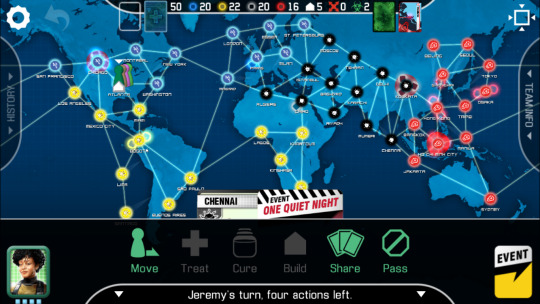
Good design #2: Jimmy John’s
Their website stores information from previous orders, including what you ordered, where it was delivered, and payment information. This makes ordering very quick and simple. Their sandwiches are then also delivered quickly. The only problem I’ve had is that the customization of sandwiches doesn’t offer the option to add sprouts to my sandwich, so I’ve been entering the name on the order as “Add sprouts plz,” which is kind of weird, but it’s a very minor inconvenience.
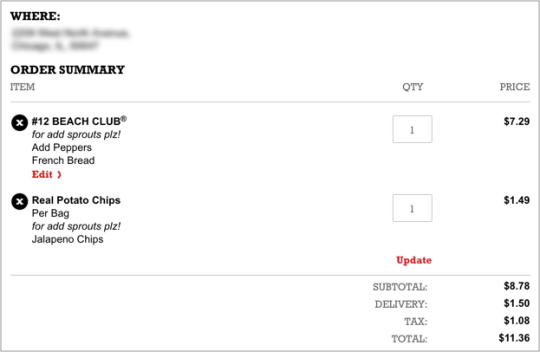

Good design #3: Uber
No money exchanged between driver and passenger. There is a pool option which is slower but cheaper. Passenger knows his driver's name as well as what kind of car he’s driving, his license plate number, estimated time of arrival. The user can even see on the map where his ride is. This makes for a very smooth transaction from start to finish.

Bad design #1: 4moms Mamaroo
Touchscreen. Seems simple enough, right? Except that it’s not a touchscreen. Surprise! There are buttons on either side that are raised very slightly and are the same color as the surrounding rubber, making them almost impossible to see in low light. The buttons should be colored differently or, even better, make the touchscreen a touchscreen.

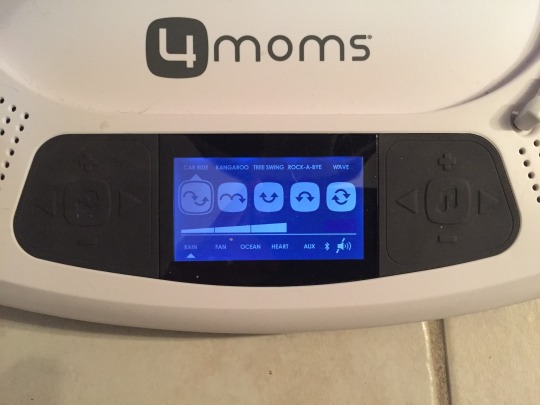
Bad design #2: My car’s navigation screen/audio player
I have to scroll through the hundreds of artists (or worse, 10s of thousands of track listings) on my device to get to what I want. It should be set up to allow searching. Also they stopped making software compatibility updates after iPhone 5, so I have to use my iPod instead of streaming music from Spotify on my phone.
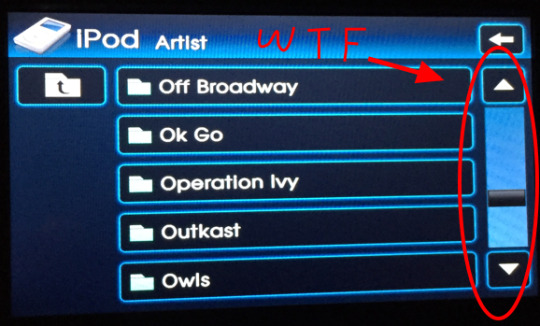
Bad design #3: Adobe Suite
Hear me out. Adobe Suite is wonderful. Between Photoshop, InDesign, After Effects, Illustrator, and now Experience Design, Adobe offers products with complete functionality to accomplish any design project you can dream up. That said, Adobe products have a pretty steep learning curve. There are so many options, it makes it hard for a beginner to know how to do anything. There are 23,703 videos on lynda.com teaching people how to use Photoshop, versus 208 for Sketch. I know, there is a chasm of difference between what Photoshop and Sketch can do, but there are 114 times as many videos for Photoshop as there are Sketch. A possible solution to this could be to offer users to enable or limit features based on their level of experience: novice, intermediate, seasoned, expert, god. Something like that. Only offer so much to the user at a time, and offer in-app instruction to empower the user. This will help get them comfortable with the software faster and produce projects they’re more satisfied with.
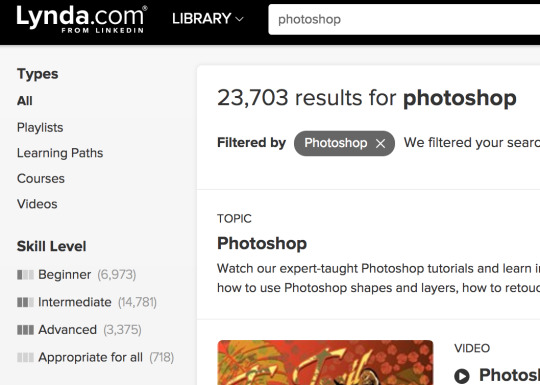
0 notes
Text
“Who am I? Why am I here?”
My name is Ed and this is my inaugural tumblr post! Huzzah!
If you’re reading this, it’s probably because you’re: a. interested in hiring me for a UX position, or b. interested in pursuing a UX position by way of enrolling in General Assembly’s User Experience Design Immersive course. Fingers crossed for option A, but either way, I hope you find this illuminating.
Where to begin? I guess I’ll start by saying I learned how to read when I was 4-years old, without having been taught. I also learned how to ride a bike without being taught – my friend ran into his house for a minute and while he was inside, I got on his bike and just started riding it. I was put into the gifted classes when I was in Kindergarten. I say these things not to brag, because, as you’ll see, having all of this evidence of being intellectually “gifted” actually ended up backfiring. Having been told repeatedly, from a very young age, how bright I was, developed in me this assumption that, somehow, I’d figure things out. Later, when I graduated high school by the skin of my teeth, I decided to delay going to college because I clearly didn’t have any motivation to do well in school. Plus college is really, really expensive, so if I didn’t do well enough for it to pay off, I’d better not waste all that time and money.
Because I didn’t go to college as an 18-year old, I had to start working. Without a college degree, my options were somewhat limited. I bounced around from job to job. I worked at a car wash for a while, then an art framing store, then a bookstore, then a coffee house, then I delivered pizzas, then back to another bookstore, then a restaurant, etcetera, etcetera. None of them paid well, and I was too young and headstrong to keep working in a place that I knew was a dead-end. After all, I was a gifted kid – I was meant for something great! Right?
I got my first taste of what it was like to work somewhere I really liked when I got a job at a musical instruments store. It was retail, yes, but it was music! I’ve played guitar and drums for years (and should probably be much better at both, but I digress), and now they were letting me work with those things! And my co-workers were all passionate about music, too! I went from working in the warehouse to working in sales, which led to my next job, once I quit for some stupid reason that only a headstrong 20-year old would quit over. Goodbye guitar store, hello cellphone store! Ugh. I was such an idiot.
Fast forward a few years to when I’m 23. I’ve started taking 1 or 2 courses per semester at the community college (though still not motivated enough to get good grades) and am working as a bank teller. This was the first job I was really good at. My boss noticed that, and he liked me personally, so he started giving me more responsibility. Within six months, I was promoted to personal banker and given a key and the security codes to the branch. Soon after, I was put in charge of managing quality and compliance for all IRA accounts that were opened at any of our 12 branches, and whenever necessary, I’d act as teller supervisor. I trained tellers and personal bankers, and helped to create our process for training employees in sales techniques. During my time at the bank, I also met an incredible woman named Molly, who would later become my wife. The bank merged with another community bank and we were growing. I was told there were plans to make me the branch manager of the next branch that opened, which wouldn’t be too far in the future. Not too bad for someone who hasn’t even graduated college, eh? (cracks knuckles) Then in 2008, when the economy collapsed, our bank went under and I was out of a job.
I spent only a few weeks on unemployment before I took a job at another music retailer and quickly realized it wasn’t quite the splendid opportunity it had been when I was just a few years younger. It paid horribly (less, actually, than the unemployment I had been receiving) and I had to work crappy hours, so I tried to get back into financial services. This was when I started working for an insurance company and had another milestone: the first job I was really bad at. Coming off the high at my previous job at the bank, it was hard medicine to take, especially because the job was so seemingly elementary. I was processing paperwork for underwriters. With my background and pedigree, this should have been a breeze, right? Apparently I was either working with super geniuses or I was really in the wrong line of work because I consistently found myself ranked in the bottom quartile of our team. Well, I guess finding out what you want to do means also finding out what you don’t want to do. It’s good to fail at things sometimes too, particularly when you think they’re beneath your abilities; it keeps you grounded. The upside here is that (to rewind a few years), while I was still working at the bank, Molly had finally given me a reason to take my education and my career seriously. She had already completed a BA at one school and had moved to Chicago to work on a second degree in graphic design. I hesitate to say she was my muse, but I at least felt enough shame for having not graduated college (and for doing poorly in the courses I was sporadically taking at community college) that I got focused on my schoolwork, and started getting straight A’s. Toward the end of my tenure at the insurance company, I graduated from Elmhurst College with a 3.5 GPA in business administration and psychology. I learned I was really interested in psychology and thought about pursuing a PhD, so I could do research and teach at a university. I think I made the right decision not taking that route, but I was left wondering, “what now?”
First things first, I’m taking my newly minted degree and I’m getting the hell out of this insurance company! I moved to the city to live with Molly, who is my fiancé by this point, and as luck would have it, our apartment was walking distance from the Chicago Music Exchange. If you’re not familiar, this store is not like other musical instrument retailers. It’s a mecca. Internationally headlining musicians make a point of stopping there while on tour. They have historical gear like a guitar Jimi Hendrix owned, and the double-neck bass guitar from “This is Spinal Tap.” Places like Guitar Center or Sam Ash have sales floors; Chicago Music Exchange has a showroom. Might it be time to look again at the retail music industry? I think so. I took a job in their warehouse just to get my foot in the door and after about 3 months a position opened up in the accounting department, which at the time consisted of their finance director and the person working below her; the position that had just become available. Guess who got that job.
At the risk of sounding conceited, this was the next job I had that I was really good at. That’s not me saying that, that’s my manager, the owner, the head of operations, and many others saying that. I worked like a madman all day, everyday. I stayed late, I took work home with me, and I even went in on the day I got married. Granted, it was just a courthouse wedding, and Molly and I were only doing it to prevent wedding day jitters when we had our “actual wedding,” but still. I was extremely dedicated. I wrote processes, I trained people, and sometimes I even saw rockstars like Carlos Santana or Billy Corgan hanging out in the showroom. It was awesome. Then I heard about at opening in the accounting department at The Windish Agency, a booking agency for bands and DJS. That would officially put me in “the music business.” I had arrived.
Well not quite. As it would turn out, this was another job I’d have trouble with. Boo. I met with a career counselor to try to figure out why. She said I was probably in the wrong line of work. I said, “duh.” She said that rather than trying to find a good career for me, we should look at the problem as though we were trying to create a career that would be perfect for me. To accomplish that, we spent 14 weeks sifting through all the jobs I’ve had, my aptitudes, weaknesses likes, dislikes, successes, failures, and unresolved childhood issues. After that, we had a short list of careers for which I might be a great fit; UX was at the top. She said I should learn as much as I could about UX and to start by talking to anyone I know who works in UX. I met with a UX designer through a family friend who made me think it was not only the right thing to do, but it was also achievable. In hindsight he was probably a little too optimistic about how achievable it was to break into UX, because I got the impression that the industry is basically so hard up for people, they’ll take anyone who can give even a B- answer as to what User Experience Design is. I’m actually really glad that’s not true.
I decided to take the part time UX design course at General Assembly last year, with the notion that “once I get through this, I’m on my way to a fabulous career in user experience design,” despite having no design-related work experience. When I completed the course, I obviously found that wasn’t the case. Hmm… Now what? I know, I’ll put together a website to showcase my portfolio! Wait, I only have one project to showcase. I know, I’ll build more projects! Wait, I’m not very good with most of these design programs. I know, I’ll work every night to learn how to use design software and read everything I can get my hands on! I’ll go to meetups and build my network on LinkedIn! I’ll start a Dribbble account! I’ll read books like “Don’t Make Me Think,” “Lean UX,” and “Elements of User Experience.” I’ll read blogs and articles about UX! I’ll listen to podcasts and take courses on Interaction Design Foundation! So I did all of that and more, and now I feel like I’m ready to take the leap and enroll in GA’s immersive UX course. Was it a mistake to take the part-time course last year? Not at all. When I started that course, I quickly realized just how alien the “design” part of design was to me. Sketching and wire framing were completely unlike any job I’d had before. So, the part-time course gave me a really good foundation in principles and processes. Now that I’ve spent all of this time since then reading, thinking, listening, doing, breathing UX; I think I’m ready to enroll in the immersive course as that is the one geared toward career changers. I’m optimistic that this is going to pay off and I’ll be able to springboard into my first job in UX, but if it doesn’t, that won’t change anything. I’ll keep learning and working, day-in and day-out, doing everything I can to break into this industry. I’ll be sharing my experiences in UXDi here regularly, if you want to see how things are going. Thanks for reading!
0 notes